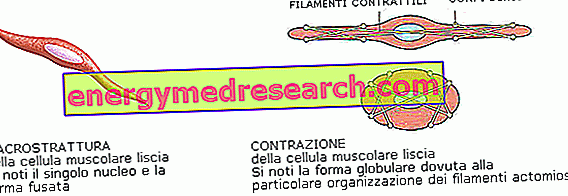Generality
Hepatic coma is a serious state of unconsciousness that distinguishes the final stage of hepatic encephalopathy, a neurological disease that results from the presence of a state of liver failure.

The treatment of hepatic coma includes hospitalization in intensive care, continuous support for vital functions, metabolic support therapy and a series of attentions aimed at preventing complications from prolonged immobility.
The prognosis is generally negative: in most cases, in fact, the hepatic coma ends with the death of the patient.
What is hepatic coma?
The hepatic coma is the serious state of unconsciousness to which subjects with hepatic encephalopathy reach the most advanced stage.
Hepatic encephalopathy is the result of structural and functional alterations of the brain, due to the presence of a severe liver deficiency, which is called liver failure .
REVIEW OF HOW THE HEPATIC INSUFFICIENCY CAUSES THE HEPATHIC ENFALOPATHY
The human liver covers very important functions for life, including:
- Production of essential proteins and hormones;
- The production of coagulation factors;
- The regulation of cholesterol levels in the blood;
- The elimination from the blood of so-called waste products, which can be toxins, infectious agents or catabolites;
- Infusion of new energy to the body when there is a general energy deficit.
Those who suffer from liver failure have a liver that is irretrievably damaged and unable to perform most of the functions listed above.

Causes
Hepatic coma may result from a state of hepatic failure, linked to the presence of an acute hepatic encephalopathy, or it may result from a state of hepatic failure, associated with the presence of a chronic hepatic encephalopathy .
Acute hepatic encephalopathy is a neurological condition resulting from very severe liver disease, acute character and rapid and sudden onset. Examples of such diseases are: acute fulminant viral hepatitis, toxic hepatitis and Reye's syndrome .
Chronic hepatic encephalopathy, on the other hand, is a neurological condition, which results from a progressive degenerative process of the liver, better known as liver cirrhosis .
WHAT IS THE MOST SERIOUS CASE?
Acute hepatic encephalopathy is a more serious and less curable condition than chronic hepatic encephalopathy.
All this clearly affects the prognosis, which tends to be much more unfavorable in the first circumstance than in the second.
Risk factors of hepatic encephalopathy:
- Nitrogen overload and subsequent increase in ammonia in the blood
- State of dehydration
- Presence of electrolyte or metabolic imbalances, such as hyponatremia, hypokalemia or alkalosis
- Improper intake of benzodiazepines, narcotics and / or antipsychotics
- Alcohol poisoning
- Hypoxia
- Infections such as pneumonia, urinary tract infections or bacterial peritonitis
- Medical interventions of transjugular intrahepatic portosystemic shunt (NB: these procedures cause hepatic encephalopathy even in the absence of a liver disease)
Symptoms, signs and complications
An individual in a hepatic coma behaves exactly like any other individual in a state of coma due to other causes (eg, severe brain trauma). Therefore:
- It cannot be awakened;
- Does not respond to any painful stimulus;
- Does not respond to changes in light;
- Does not respond to sounds;
- It lacks the sleep-wake cycle;
- He is unable to make any voluntary gesture.
COMPLICATIONS
Hepatic coma represents the most serious stage of hepatic encephalopathy.
Its occurrence is, for many patients, the prelude to death, which occurs due to cerebral edema .
Review of the stages of hepatic encephalopathy
In the absence of adequate treatments, hepatic encephalopathy undergoes an evolutionary process, characterized by a progressive worsening of the symptomatology.
After several debates, the medical-scientific community has established that, by convention, the symptom deterioration of hepatic encephalopathy can be divided into four stages (or degrees) of increasing severity:
- The first stage, called stage 1, corresponds to the initial phase of the disease, the least serious.
Some of the typical symptoms are: slight lack of attention, moderate confusion, loss of awareness, nightmares, sleep disturbances resulting in daytime sleepiness, anxiety, etc .;
- The second stage, called stage 2, is equivalent to the mild / moderate phase of the disease.
It is characterized by a worsening of stage 1 symptoms and the appearance of lethargy and apathy;
- The third stage, called stage 3, corresponds to the moderate / severe phase of the disease.
The patient at this stage becomes the protagonist of sudden and unjustified anger shots, bizarre behavior, use of incomprehensible language, irritability and high drowsiness;
- The fourth stage, called stage 4, corresponds to the final phase of the disease and the coma is its only manifestation.
Diagnosis
The diagnosis of hepatic coma is based on medical tests, specifically designed to determine whether an individual is in a coma or not, and on a series of tests, whose goal is to identify the precise causes.
Knowing precisely the origin factors of the hepatic coma can be useful in the hypothetical case of a patient awakening, when the doctors will have to plan an adequate recovery therapy and relapse prevention (or relapses).
A diagnostic test such as the CT scan shows the presence of hepatic encephalopathy only when the affected individual enters the hepatic coma.
Therapy
The treatment of hepatic coma involves hospitalization or in a similar structure, continuous support to all the main vital functions of the patient (therefore mechanical ventilation, artificial nutrition, etc.), a metabolic support therapy and a series of attentions aimed at preventing the classic complications following long periods of immobility (pressure sores, aspiration pneumonia, atelectasis, etc.).
HOSPITALITY: IN WHICH HOSPITAL AREAS YOU HOLD?
Hospitalization of people in a hepatic coma is held in intensive care .
Intensive care, or intensive care unit, is the hospital ward reserved for the hospitalization of patients in serious health conditions, who need continuous treatment, monitoring and support, in order to maintain their vital functions normally.
METABOLIC SUPPORT THERAPY: WHAT DOES IT PROVIDE?
Metabolic support therapy, reserved for people in hepatic coma, generally consists of intravenous administrations of branched chain amino acids, associated with a glucose solution.
Prognosis
Hepatic coma tends to have a negative prognosis. In fact, the chances of waking up from such a condition are small and most of the patients involved are dying.
According to some surveys, the more severe hepatic encephalopathy is at the origin of the hepatic coma and the more the chances of a revival / recovery are reduced.



